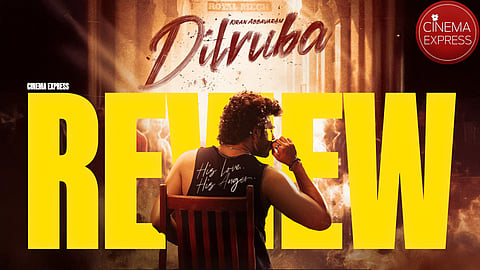Dilruba review: Striking moments trapped in a sea of oversimplified ideas
Dilruba review(2 / 5)
Debutant director Viswa Karun’s Dilruba walks the fine line between philosophy and pop wisdom with the grace of a motivational speaker on a slippery stage. The film is an earnest, character-driven love story with enough philosophical musings (the many references to Puri Jagannadh’s podcast are apparent), but it suffers from an elementary quality that reduces complex emotions to WhatsApp-forward-level quotes.
Director: Viswa Karun
Cast: Kiran Abbavaram, Rukshar Dhillon, Kathy Davison, Satya
Kiran Abbavaram plays Siddharth, a stubborn, heartbroken youngster attempting to outgrow the emotional debris left by his ex, Maggie (Kathy Davison). Having a strong repulsion to the words “sorry” and “thank you,” because of a traumatic experience with Maggie's family, Siddharth relocates to a college in Mangalore to move on in life. There, the charming and persistent Anjali (Rukshar Dhillon) enters his life, pursuing him with an almost romantic relentlessness until he falls for her. But as their love story blooms, conflict arrives, forcing Siddharth to confront his aversion to apology. Will he hold on to his pride, or will love push him towards growth?
It’s a premise ripe with emotional conflict, but Dilruba often mistakes heavy-handed verbiage for profundity. The film opens with a statement—“Strong men don’t have attitude, they have character”—so broad it feels designed to be slapped onto a motivational poster or, worse, a status update. The dialogue is peppered with philosophical nuggets like “Men who don’t make mistakes are heroes, but men who realise their mistakes are bigger heroes,” or “Life revolves around two words: sorry and thank you.” If this sounds like philosophy boiled down for teenagers, it's because it probably is. Dilruba is less of a meditation on life and more like a self-help manual for the young and impressionable.
Karun’s admiration for Puri Jagannadh is apparent, with the film soaked in a similar brand of rugged masculinity and relentless philosophising. But where Puri Jagannadh’s heroes brood with pulp cinematics, Siddharth’s journey feels like an Instagram reel caught on a loop of life lessons. The result is a film that attempts to intellectualise every emotion but lands somewhere between overstatement and oversimplification. How much philosophy is too much philosophy is a question someone should have raised… maybe during the script discussions or at least when they heard the first narration.
And therein lies the film’s miscalculation. Young audiences, the demographic Dilruba is so obviously targeting, don’t come to the cinema for life lectures. They crave stories that fulfil their thirst for thrills, maybe mirror their hardships and search for security. They want relatability, not sermons. And while Dilruba occasionally delivers on the former, it too often slides into the latter.
Does this film not have thrills? It does. That bombastic interval is probably the best action scene by Kiran Abbavaram so far. Sam CS’s score is a riot of folk beats and electronic blares, infusing the scene with energy and swagger. There’s no shortage of rage and fire in the film, but the narrative never anchors these emotions to anything deeper than surface-level conflict. The film seems to believe that if Siddharth can crack the right philosophical one-liner, his problems will vanish. Unfortunately, life and, by extension, cinema, aren’t that simple.
Technically, Dilruba impresses. Daniel Viswas’s cinematography brings a freshness to the rom-com setting, with standout moments like in a dynamic fight sequence that cleverly uses a mounted camera for visceral impact. These are flourishes that deliver in parts the tones Dilruba is aiming for: raw, emotional, and intense. Sam CS’s music, too, is electric, elevating scenes that would otherwise feel flat. The soundtrack throbs with the kind of tension and urgency that the screenplay often lacks.
Kiran Abbavaram seems to be growing with each film. But again, his expression range and vocals are something to be worked on even further. Rukshar Dhillon, however, is a delight. Her Anjali is vibrant and assertive, a woman who knows what she wants and isn’t afraid to chase it. Crucially, when Anjali’s patience wears thin, the narrative respects her decision. She is written with clarity and autonomy, a refreshing change in a genre that too often sidelines its female leads.
This is where Karun’s writing shines. Anjali’s pursuit of Siddharth feels fresh and believable, never veering into cringe territory. Her character arc is thoughtful, her choices meaningful. It’s a rare case where a romantic subplot treats both partners with dignity, offering a subtle commentary on modern relationships and consent. These are the moments when Dilruba feels like it’s tapping into something real, something profound.
But just when the film seems poised to explore these complexities, it retreats into its comfort zone of preachy platitudes. The tension between depth and simplicity becomes its undoing. Dilruba is a film caught between its desire to inspire and its fear of alienating its audience with subtlety.
In the end, Dilruba is a rom-com that oscillates between the striking and the simplistic. It dazzles with its music, visuals, and moments of genuine character insight but stumbles when it tries too hard to hammer home life lessons. For every well-executed fight sequence or heartfelt romantic beat, there’s a philosophical monologue that feels like a missed opportunity for nuance. The film wants to be profound but ends up being predictable.
And perhaps that’s the tragedy. It mistakes clarity for rhyme, depth for digestibility. It forgets that the beauty of life’s lessons often lies not in their articulation but in their messy and real reflection.

